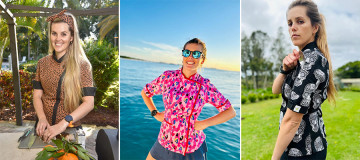
None of the five doctors Hallie Fischer had seen over seven years offered her relief for her debilitating endometriosis symptoms. Before visiting her sixth doctor last fall, Fischer sent her all of her medical records and asked her to read them carefully.
“And when she walked in to meet me for my first appointment, I said, ‘I think I have endometriosis, and if you won’t do surgery, then I’m leaving,’” Fischer said. “Her reply was, ‘I think you have endometriosis, too, and we’re going to do surgery.’ Two weeks later, I had surgery. I finally had a doctor who believed me.”
Fischer is 18, a high school senior in Havre, Montana. While many women with endometriosis suffer well beyond that age before being diagnosed, Fischer had an advantage: her mother had endometriosis symptoms for much of her life, including severe pain and infertility, before having a partial hysterectomy 10 years ago.
“When I first started having symptoms in fifth grade, my mom didn’t automatically think I had endo, but she knew what to watch out for,” Fischer said. “She had me document everything. I called it my endo diary.”
Fischer initially had heavy periods and pain. In middle school and high school, she also dealt with a fluctuating body temperature (two degrees above or below normal almost daily), extreme nausea that caused significant weight loss, and pain in her right side that put her in the ER four times. Doctors thought each time that it was appendicitis. When they determined it wasn’t, they sent her home.
Fischer would bounce from one doctor to the next, each with a remedy that didn’t work. One doctor wouldn’t even do an ultrasound, claiming Fischer pulled a muscle. From the ages of about 13 to 17, other doctors put her on birth control, gave her estrogen, or put her into medically-induced menopause.
“They said I was too young to have endo or that a lot of young girls have these issues with their cycle,” Fischer said. “One doctor did say she thought I might have endo but that I was too young for surgery. All they wanted to do was try to fix everything with hormones.”
The symptoms and failed solutions impacted Fischer mostly in school. Last year, as a junior, she quit the golf team and was forced to stay home and attend school online.
“I struggled most with having enough energy to function, absorb the material in class, and do my homework,” she said. “And then getting up at 6:30 every morning, not being home until almost 4:30, and always being on the go—I never had time to rest.”
While Fischer tried to keep up with her studies, she continued searching for answers. Part of her challenge was that she lives in a small town in a remote area, just south of the Canadian border. Had the sixth doctor failed to help—a new gynecologist Fischer found at a nearby hospital specializing in pelvic pain—Fischer was prepared to travel 700 miles to Salt Lake City, where she’d discovered some endometriosis specialists online. Fortunately, the local doctor came through.
“She found endometriosis on the outside of my uterus, my pelvic bone, and my bladder,” Fischer said. “She also found a cyst on my left ovary that was larger than my uterus.
“My surgery was only three weeks after my eighteenth birthday,” Fischer continued. “On my birthday, I didn't feel like an adult; I still felt like a kid. The day of my surgery is when I felt like I’d become a woman.”
Fischer said she’s doing better today.
“I have good days and bad days, but the bad are nothing compared to before,” she said. “The worst part has been trying to figure out how to exist without having all of my endo symptoms because I had them for so long. It’s been quite an adjustment not having the pain and bleeding all the time.”
Fischer continues to attend school online. She said that has allowed her to take several dual credit courses, which she couldn’t have done had she been physically in school. It has also taught her how to learn more independently, preparing her for college and life beyond. She plans to attend Dickinson State University in North Dakota next fall to study business administration in entrepreneurship. While some women with endometriosis might be nervous about moving seven hours from home, Fischer is looking forward to it.
“I don’t think I’ll need another surgery for a while,” Fischer said. “And Dickinson will have a lot more resources than I have here. There will be more opportunities to exercise because they have a gym, and I’ll be able to eat healthier because they have better grocery stores. I’m really excited to go.”
Fischer said she knows she’s fortunate her mom knew about the disease.
“Starting at a young age, I saw my mom’s struggles with her endometriosis, and it was one of the worst things I’ve ever seen. I thought she was dying because of how ill she was,” Fischer said. “From those early years until when I was in the hospital with her after her last surgery, I knew what a complex disease this was.”
Fischer hopes sharing her story will help others who are suffering.
“I want them to know they aren’t alone and to keep advocating for themselves until they receive the help they need,” Fischer said. “What they are feeling isn’t normal, even though so many people tell us it is. With every little thing we feel is an underlying problem, and you can’t fix it until you know what it is. I had doctors who just wanted to fix the symptoms and not the problem. Girls my age need to know there is someone out there who will help them. It might take a lot more effort, but they will find the answers they need.”
*Patient stories submitted to EndoFound.org are the patient's views, not necessarily those of the foundation. All testimonials are from real patients, may not reflect the typical patient’s experience, and are not intended to represent or guarantee that anyone will achieve the same or similar results.









